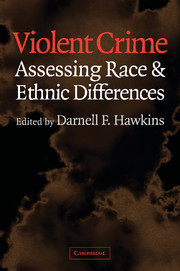Foreword
Published online by Cambridge University Press: 22 August 2009
Summary
Despite impressive achievements, American criminology continues to suffer from a host of theoretical and methodological weaknesses. Among these, conceptualization and measurement of race and ethnicity, and of racial and ethnic behavioral differences, are major impediments to the advancement of knowledge. This is not unique to criminology, of course, but that neither excuses nor explains our failure to do a better job. Darnell Hawkins's introductory essay explores both the validity and the reliability of biological and social constructions of race – topics too long neglected by criminologists.
Importantly, this volume explores racial and ethnic distinctions beyond the familiar African-American/white, as well as recognizing that ethnic distinctions have achieved global importance in an increasingly mobile world.
The concentration of American criminologists on crime and criminals in the United States is a problem of long standing. This somewhat ethnocentric – not to say myopic – practice is not a major focus of the present volume, but research from Canada, New Zealand, and England and Wales adds a great deal to the book.
Ethnocentrism takes many forms and here again Darnell Hawkins and his colleagues are enlightening. Scholars in the social and behavioral sciences are notorious for conducting our research within the boundaries of our disciplines – this, despite the inherently interdisciplinary nature of criminology. Moreover, we tend to restrict our vision within narrowly defined methodological and theoretical preferences. Chapters in this volume approach racial and ethnic contexts of violence from a variety of disciplinary, methodological, and theoretical perspectives.
- Type
- Chapter
- Information
- Violent CrimeAssessing Race and Ethnic Differences, pp. xi - xiiPublisher: Cambridge University PressPrint publication year: 2003

